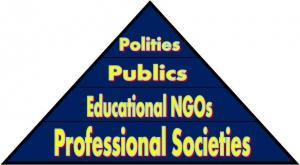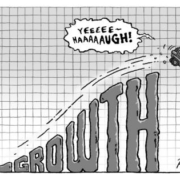Game Changer: National Wildlife Federation Adopts a Resolution on GDP
 Among the world’s biggest environmental organizations, there is now a clear leader of the sustainability pack. The National Wildlife Federation has boldly gone where the Sierra Club, World Wildlife Fund, Defenders of Wildlife, and so many others have feared to tread. As the first big NGO in the 21st century to raise awareness of the trade-off between economic growth and environmental protection, NWF has earned the admiration of a burgeoning group of citizens.
Among the world’s biggest environmental organizations, there is now a clear leader of the sustainability pack. The National Wildlife Federation has boldly gone where the Sierra Club, World Wildlife Fund, Defenders of Wildlife, and so many others have feared to tread. As the first big NGO in the 21st century to raise awareness of the trade-off between economic growth and environmental protection, NWF has earned the admiration of a burgeoning group of citizens.
Which burgeoning group is that, you ask? Let’s call it the Common Sense Club. They’re tired of the propaganda that we can have our environmental cake and eat it too. The Common Sense Club knows there’s a limit to economic growth, and that growth has been causing more problems than it solves. No, they’re not for high unemployment or poverty – of course not! – but they’re also not for imperiling our grandkids by ruining the environment. The Common Sense Club realizes that, if we care about wildlife, the grandkids, national security, and international stability, we have to strike a balance between the size of the economy and the environment that sustains it.
At CASSE, we’re more aware by the day of how rapidly the Common Sense Club is growing and how diverse it’s becoming. Take for example the five most recent signatories of the CASSE position on economic growth: a Croatian air traffic controller, an Indian economics professor, a Swedish artist, an American banker (that’s right, a banker), and a Dutch computer scientist. The group of steady state signatories is ranging far beyond the original bunch of ecologists and economists who kicked it off seven years ago (although I like to think the original bunch had some common sense too).
But back to the NWF and its resolution on GDP growth; now that’s a real game changer. For the sake of ecological and economic sustainability, the news could hardly be bigger. We finally have a significant counterweight to the neoclassical nonsense that “there is no conflict between growing the economy and protecting the environment.” To put this counterweight in political perspective, the NWF, at 4.4 million strong, has more members than the National Rifle Association. It’s a centrist organization with a rock-solid history.
Why bring the NRA into this? It makes for an interesting contrast because, like the NRA, NWF counts a lot of hunters, fisherman, and general conservationists among its membership. Indeed there is substantial overlap in membership. But NWF also includes a great number of wildlife aficionados who have never pulled the trigger of more than a water pistol. It’s the rare, well-rounded organization that unites citizens far and wide over a mission everyone supports: wildlife conservation.
And wildlife conservation – indeed environmental protection in general – is not a supportable mission as long as the overriding goal is economic growth. That’s why, since the late 1990’s, dedicated ecologists and ecological economists have been toiling in the trenches of professional, scientific societies, engaging these societies in the subject of economic growth. They’ve been working toward days like April 15, when NWF adopted its resolution.
In these scientific societies, efforts have focused on the development of papers and policy statements explaining the trade-off between economic growth and environmental protection. For example, in 2003 The Wildlife Society published a technical review explaining the “fundamental conflict between economic growth and wildlife conservation.” In 2004 the Society for Conservation Biology (North America Section) took the position that “There is a fundamental conflict between economic growth and biodiversity conservation based on the ecological principle of competitive exclusion.” In 2007, the American Society of Mammalogists adopted a resolution noting the “fundamental conflict between economic growth and the conservation of ecosystems, mammalian populations, and species.” Note that the trade-off is often described as a “fundamental conflict” because it ultimately boils down to core principles of physics and ecology.
The scientific societies have addressed the issue of economic growth in such venues as peer-reviewed papers, special sections, and series in journals; symposia, plenary talks, and workshops; working groups and committees; editorials and debates, etc. These academic studies and discussions are a critical phase in a broad movement to build awareness, as illustrated below.

Basic Vision of Awareness-Building
Meanwhile the NGOs (such as NWF) need a sound, scientific foundation to build upon. Otherwise any talk of trade-offs with economic growth can be blown away in the political winds. The collection of papers, proceedings, position statements and policy reviews now constitutes that foundation.
Of course the process of awareness-building isn’t quite as simple as building a pyramid from the bottom up. It is also an iterative process in which NWF’s resolution will empower yet another scientific society to take a position on economic growth, thereby firming up the foundation. The strengthened foundation may then provide the support for the next big NGO (perhaps the World Wildlife Fund, Friends of the Earth, or Sierra Club?) to weigh in. The NGOs are key because, unlike the scientific societies, they have the resources (staff, magazines, mailing lists, etc.) to educate the masses, beginning with their own substantial memberships.
Meanwhile, the general public (third level in the diagram) is being populated by the Common Sense Club. As the Common Sense Club grows, NGOs such as NWF can feel more comfortable telling it like it is about the perils of economic growth. They won’t be left out in the cold, and will in fact attract many new members.
It should also be noted that the NWF didn’t use the “fundamental conflict” language in its resolution. Rather, they simply pointed out that GDP is a poor indicator of welfare because it doesn’t account for many important goals, such as wildlife conservation. But when we recognize that GDP is THE indicator of economic growth, it’s easy to get the point: there is a trade-off between economic growth and wildlife conservation.
Like CASSE, NWF would like to see indicators other than GDP used to assess human welfare. GDP is like the scale for an obese patient; it’s good for indicating how overweight the economy is becoming. But we need a blood pressure cuff and a stethoscope, too, for a broader picture of health. The Genuine Progress Indicator (GPI) and Index of Sustainable Economic Welfare (ISEW) are examples of indicators that help us form a broader perspective of human welfare.
It should also be noted that, in the diagram above, the politicians at the top aren’t necessarily essential for a sustainable outcome. If the scientific societies, NGOs, and general public are adequately aware of the trade-offs between economic growth and environmental protection (and so much else), a steady state economy can result from the “demand side.” In other words, less consumption and more family planning can stabilize the economy regardless of how much the policy makers try to “stimulate” the economy. Ideally, though, policy makers will serve the public that elects them, and gradually set those fiscal and monetary policy levers back toward a sustainable steady state.
Normally, I reserve my own charitable contributions for a few choice NGOs, most notably CASSE and the irresistible Smile Train. But this year I’m joining NWF, and I hope you do too. They earned it!




You embrace NWF for being the first big environmental organization to recognize limits to growth.
Who will be the first to embrace negative growth as a necessity? CASSE hasn’t even done that!
The necessary adjustments for “negative growth” are contained in CASSE´s position, I believe, though certainly there are various elements of the whole economic issue that are not the focus here…. Those details here are sometimes raised in the posts….
Nice to read Mr. Czech´s piece, though Friends of the Earth UK does use the ISEW at their website. Sierra Club and Greenpeace for their parts have advanced such movements and practices as Fair Trade, organic certification, and ozone safe technology, not to mention solar and wind strategies. They have both sponsored alternative reports of renewable energy development, so it´s certainly not due to a lack of important activity that they have neglected alternative indicators. WWF, too, has promoted the Living Planet Index, a significant document.
I think a larger point concerns coalition building and diverse specializations. As Brian mentions at the end of his piece, the advance of practical and popular efforts is ultimately essential and an important priority. The ISEW and GPI are effective most of all in conjunction with this coalition and network of activity. Global Exchange and Green America´s Green Festivals, increasing in number steadily, are a fun example of this, while William Greider´s discussion of the Rainforest Action Network´s work, inaddition to Prof. Daly´s work and others, in his book The Soul of Capitalism, is another angle.
We finally have a significant counterweight to the neoclassical nonsense that “there is no conflict between growing the economy and protecting the environment.” … Pardon me, but can you point me to an actual neoclassically trained economist, with respectable research credentials in the area of environmental economics, who is trying to say that there are NO opportunity costs to consider in the growth vs. environment dilemma? Perhaps instead of the implied neoclassical economists, you mean “industry advocates” or “politicians” or “special interest groups.” There are at least 1000 primarily neoclassical economists who are paid-up card-carrying members of the Association of Environmental and Resource Economists. Very few of these people self-select into this organization based on a conviction that the environmental consequences of economic activity can be ignored. Most have spent the greater part of their careers worrying about these types of tradeoffs. There are a number of competing understandings of the idea of neoclassical economics, of course, but blaming the “neoclassical” economic paradigm for the bad behavior of special interest groups in their efforts to influence policy is like blaming criminologists for crime.
Perhaps the problem is that non-economists see the profession as monolithic. There is no credentialing organization that screens economists like the AMA screens doctors or the Bar Association screens attorneys. Almost anybody with a modicum of training or real-world experience can bill themselves as an economist. Your constituency might benefit from realizing that “environmental economist” is not any oxymoron. To be sure, environmental economists adopt a philosophical perspective (teleological) that differs fundamentally from that taken by ecological economists (deontological). These differing philosophies sometimes lead members of each group to view the other as “wrong-headed” in some respects. However, there is truly no basis upon which to conclude that either group actually IS right or wrong. Each approach has its shortcomings and impracticalities. But please don’t tar all neoclassical economists with the same brush used on pro-growth industry advocates who deny the existence of environmental opportunity costs.
Trudy, I agree to some extent with your critique, but I have certainly had some debates with neoclassical economists that left me scratching my head. In one such debate, the highly credentialed and published professor swept away every point I made about the limits to growth by stating that he couldn’t see any way to pull people out of poverty other than continuing the current program of economic growth. My response was, “Just because you can’t see it, that doesn’t mean it fails to exist.” His counter-response was silence.
Having said that, there are many economists, as you rightly conclude, who understand the opportunity costs of growing the economy. I understand your frustration with the way all economists have been lumped together in the article. I do know for a fact, however, that Brian Czech doesn’t classify the entire lot of economists as “wrong-headed.” You might be interested in reading one of his previous articles in which he describes his enlightening experience at the conference of the Eastern Economic Association.
As an activist who got his master´s with significant doses of neoclassical academia, the post by TAC is more akin to a Republican member of Republicans for the Environment saying you can´t blame Republicans for their anti-environmental views.
Neoclassical economists are overwhelmingly ignorant and negligent in their treatment of subjects, and 1000 members of the Enviro Econ club is hardly a smidge in the ocean.
Great news, I know CASSE has been working towards this for some time.
The Australian Conservation Foundation (ACF) is Australia’s biggest environmental NGO*, and last year released their position called ‘Better Than Growth’:
http://postgrowth.org/australian-conservation-foundation-adopts-better-than-growth-policy/
ACF have not yet signed the CASSE position, but CASSE reps in Australia are on the…er, case!
* 41,000 paid up members and many more supporters; to put this in context, our population is 22.5 million